高考英语介词讲解
- 格式:docx
- 大小:38.11 KB
- 文档页数:8
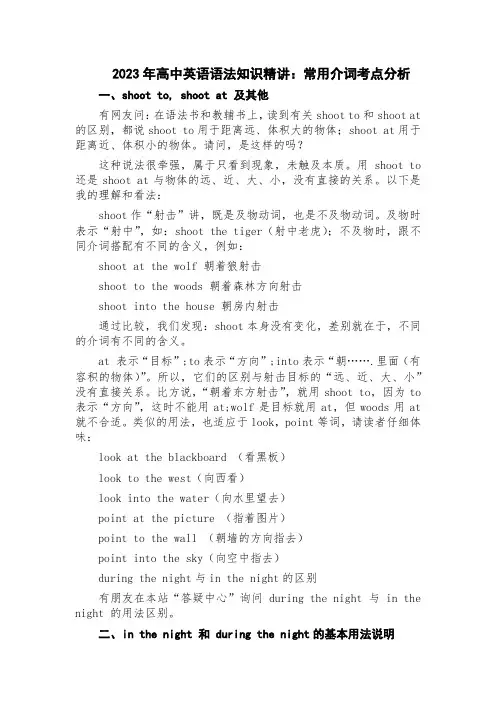
2023年高中英语语法知识精讲:常用介词考点分析一、shoot to, shoot at 及其他有网友问:在语法书和教辅书上,读到有关shoot to和shoot at 的区别,都说shoot to用于距离远、体积大的物体;shoot at用于距离近、体积小的物体。
请问,是这样的吗?这种说法很牵强,属于只看到现象,未触及本质。
用shoot to 还是shoot at与物体的远、近、大、小,没有直接的关系。
以下是我的理解和看法:shoot作“射击”讲,既是及物动词,也是不及物动词。
及物时表示“射中”,如:shoot the tiger(射中老虎);不及物时,跟不同介词搭配有不同的含义,例如:shoot at the wolf 朝着狼射击shoot to the woods 朝着森林方向射击shoot into the house 朝房内射击通过比较,我们发现:shoot本身没有变化,差别就在于,不同的介词有不同的含义。
at 表示“目标”;to表示“方向”;into表示“朝…….里面(有容积的物体)”。
所以,它们的区别与射击目标的“远、近、大、小”没有直接关系。
比方说,“朝着东方射击”,就用shoot to,因为to 表示“方向”,这时不能用at;wolf是目标就用at,但woods用at 就不合适。
类似的用法,也适应于look,point等词,请读者仔细体味:look at the blackboard (看黑板)look to the west(向西看)look into the water(向水里望去)point at the picture (指着图片)point to the wall (朝墙的方向指去)point into the sky(向空中指去)during the night与in the night的区别有朋友在本站“答疑中心”询问 during the night 与 in the night 的用法区别。
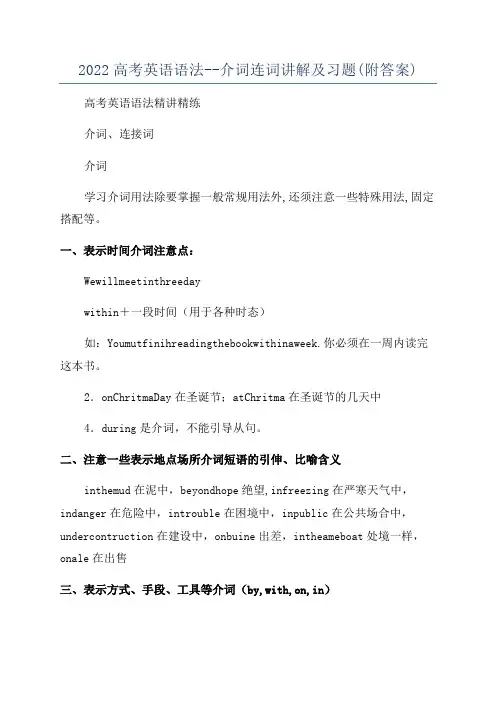
2022高考英语语法--介词连词讲解及习题(附答案)高考英语语法精讲精练介词、连接词介词学习介词用法除要掌握一般常规用法外,还须注意一些特殊用法,固定搭配等。
一、表示时间介词注意点:Wewillmeetinthreedaywithin+一段时间(用于各种时态)如:Youmutfinihreadingthebookwithinaweek.你必须在一周内读完这本书。
2.onChritmaDay在圣诞节;atChritma在圣诞节的几天中4.during是介词,不能引导从句。
二、注意一些表示地点场所介词短语的引伸、比喻含义inthemud在泥中,beyondhope绝望,infreezing在严寒天气中,indanger在危险中,introuble在困境中,inpublic在公共场合中,undercontruction在建设中,onbuine出差,intheameboat处境一样,onale在出售三、表示方式、手段、工具等介词(by,with,on,in)1.by:Theblindmenthoughttheycouldlearnwhattheelephantlookedli kebytouchingit./makealivingbyteaching/byhand手工地,靠手工地,byletter,bypot,byelectricity,learnth.byheart,truckbythebeauty因美丽而着迷Hewapaidbythehour/theday/month/…他按时/日/月/…被付给工钱。
byplane/train/hip/air/water/ea/…,bymeanof用…手段,方式;bywayof经由,取道于…learnEnglihby/over/throug h/ontheradio2.on:liveonfood,kneelonone¢knee,lie/leeponone¢back/ide/face 仰/侧/俯卧(睡)3.in:inEnglih,inink,inilence,inonevoice异口同声地,inahurry 匆忙地,inurprie惊讶地4.with:writewithapen,workwithone¢hand,mellwithone¢noe,beatt hehorewithawhip(鞭子)四、相近介词(短语)辨析about“关于”,知识性或随便谈论:adicuionabouttheplan3.over在…正上方,under在…正下方above在…上面(不一定垂直上方),below在…下面4.inanhour一小时后,用于将来时afteranhour一小时后,用于过去时5.beide在…旁边beide除…之外(还有)e某cept除…之外e某ceptfor除(非同类事物)之外6.on/inthetreetat50DongfengRoad在东风路50号高考英语语法精讲精练7.aholeinthewallapictureonthewallapieceofnewinthenewpaperthewordintheenvelopthemonkeyinthetreetheappleonthetree(树上的苹果。
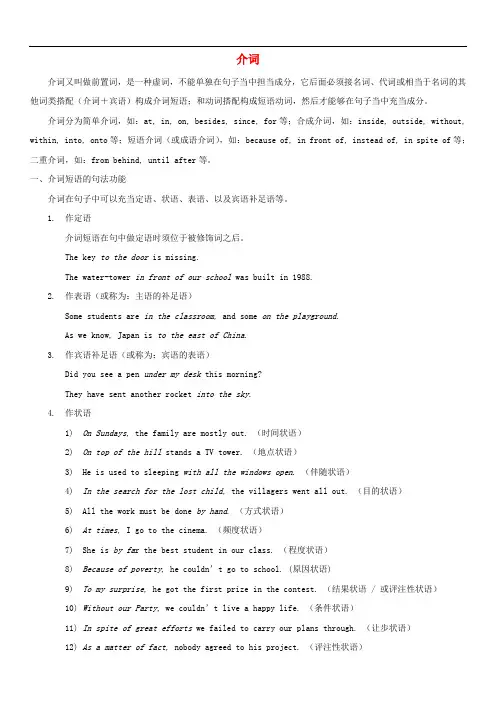
介词介词又叫做前置词,是一种虚词,不能单独在句子当中担当成分,它后面必须接名词、代词或相当于名词的其他词类搭配(介词+宾语)构成介词短语;和动词搭配构成短语动词,然后才能够在句子当中充当成分。
介词分为简单介词,如:at, in, on, besides, since, for等;合成介词,如:inside, outside, without, within, into, onto等;短语介词(或成语介词),如:because of, in front of, instead of, in spite of等;二重介词,如:from behind, until after等。
一、介词短语的句法功能介词在句子中可以充当定语、状语、表语、以及宾语补足语等。
1.作定语介词短语在句中做定语时须位于被修饰词之后。
The key to the door is missing.The water-tower in front of our school was built in 1988.2.作表语(或称为:主语的补足语)Some students are in the classroom, and some on the playground.As we know, Japan is to the east of China.3.作宾语补足语(或称为:宾语的表语)Did you see a pen under my desk this morning?They have sent another rocket into the sky.4.作状语1)On Sundays, the family are mostly out. (时间状语)2)On top of the hill stands a TV tower. (地点状语)3)He is used to sleeping with all the windows open. (伴随状语)4)In the search for the lost child, the villagers went all out. (目的状语)5)All the work must be done by hand. (方式状语)6)At times, I go to the cinema. (频度状语)7)She is by fa r the best student in our class. (程度状语)8)Because of poverty, he couldn’t go to school. (原因状语)9)To my surprise, he got the first prize in the contest. (结果状语 / 或评注性状语)10)Without our Party, we couldn’t live a happy life. (条件状语)11)In spite of great efforts we failed to carry our plans through. (让步状语)12)As a matter of fact, nobody agreed to his project. (评注性状语)In my opinion,you’d better go with us.二、介词的复合结构“介词+宾语+补足语”可以构成介词的复合结构,在句子当中可充当表语、定语、状语、补语等。
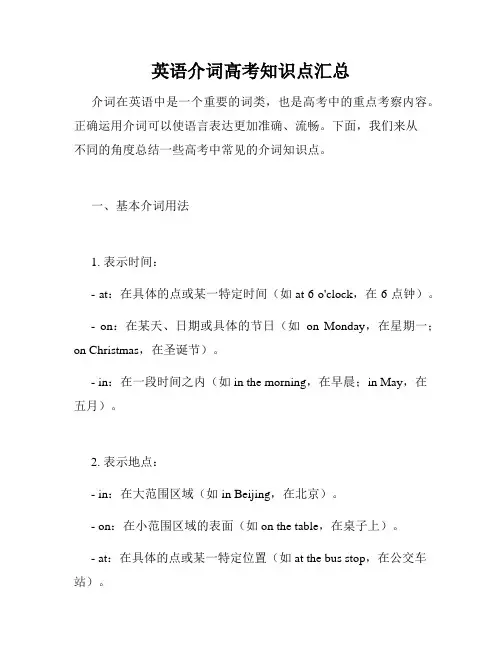
英语介词高考知识点汇总介词在英语中是一个重要的词类,也是高考中的重点考察内容。
正确运用介词可以使语言表达更加准确、流畅。
下面,我们来从不同的角度总结一些高考中常见的介词知识点。
一、基本介词用法1. 表示时间:- at:在具体的点或某一特定时间(如at 6 o'clock,在 6 点钟)。
- on:在某天、日期或具体的节日(如on Monday,在星期一;on Christmas,在圣诞节)。
- in:在一段时间之内(如in the morning,在早晨;in May,在五月)。
2. 表示地点:- in:在大范围区域(如in Beijing,在北京)。
- on:在小范围区域的表面(如on the table,在桌子上)。
- at:在具体的点或某一特定位置(如at the bus stop,在公交车站)。
3. 表示方式、原因、目的等:- for:表示对某人或某事有利(如good for health,有益于健康)。
- by:通过某种方式或手段(如by bus,乘坐公交车;by the way,顺便说一下)。
- with:伴随某物或某人一起(如play with friends,和朋友一起玩)。
4. 表示动作的方向或位置:- to:表示朝着某处(如go to school,去学校)。
- from:表示从某处来(如come from China,从中国来)。
- into:表示进入某处(如go into the room,进入房间)。
5. 表示从属关系:- of:表示所属关系(如a friend of mine,我的一个朋友)。
二、固定搭配1. look forward to:期待- I'm looking forward to the summer vacation.(我期待着暑假的到来。
)2. be fond of:喜欢- She is fond of playing basketball.(她喜欢打篮球。
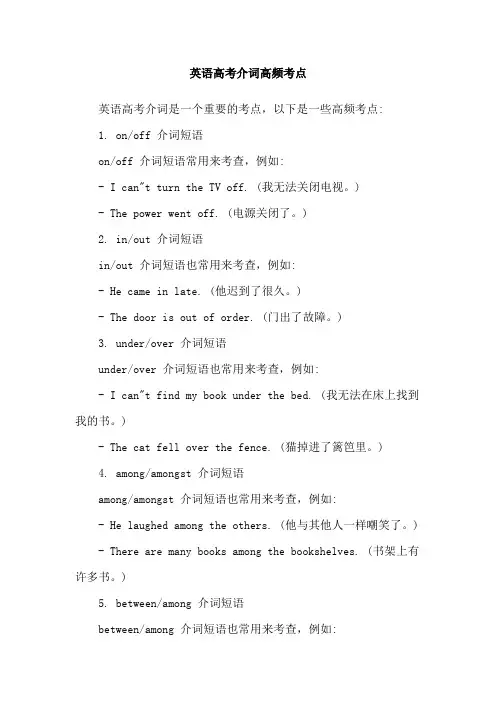
英语高考介词高频考点英语高考介词是一个重要的考点,以下是一些高频考点:1. on/off 介词短语on/off 介词短语常用来考查,例如:- I can"t turn the TV off. (我无法关闭电视。
)- The power went off. (电源关闭了。
)2. in/out 介词短语in/out 介词短语也常用来考查,例如:- He came in late. (他迟到了很久。
)- The door is out of order. (门出了故障。
)3. under/over 介词短语under/over 介词短语也常用来考查,例如:- I can"t find my book under the bed. (我无法在床上找到我的书。
)- The cat fell over the fence. (猫掉进了篱笆里。
)4. among/amongst 介词短语among/amongst 介词短语也常用来考查,例如:- He laughed among the others. (他与其他人一样嘲笑了。
) - There are many books among the bookshelves. (书架上有许多书。
)5. between/among 介词短语between/among 介词短语也常用来考查,例如:- I can"t find my keys between the sofa and the wall. (我无法在沙发和墙上找到我的钥匙。
)- The children played happily among the flowers. (孩子们在花丛中玩得很开心。
)这些介词短语在英语高考中常常会出现,考生需要熟练掌握它们的含义和用法,以便在考试中更好地应对。
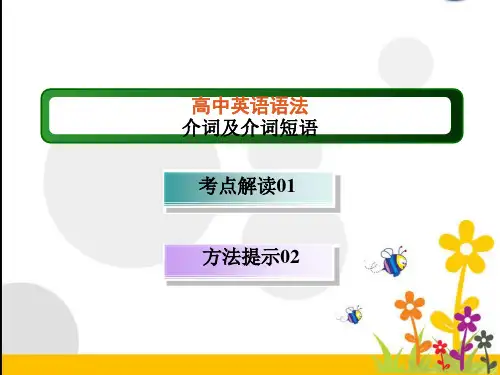
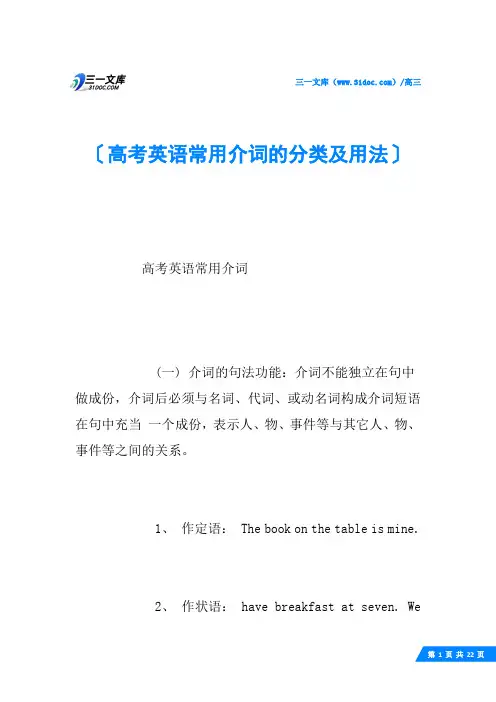
三一文库()/高三〔高考英语常用介词的分类及用法〕高考英语常用介词(一) 介词的句法功能:介词不能独立在句中做成份,介词后必须与名词、代词、或动名词构成介词短语在句中充当一个成份,表示人、物、事件等与其它人、物、事件等之间的关系。
1、作定语: The book on the table is mine.2、作状语: have breakfast at seven. We(表时间)They were late for meeting because of the heavy ; rain.(表原因) ;They started the machine by pressing the button.(表方法)3、作表语: My dictionary is in the bag.4、作宾语补足语: I found him in the office.(二) 1.表示时间的介词(1) in表示“在某一时间段”或“在某一时候”,如用在月、季、年份、时代、世纪等时间名词的前面,或用来泛指一天的某一段时间。
in也可以指“在……之后”,表示从说话起的若干时间内。
如: in July/summer/2000/ancient timesThe bus will be here in ten minutes.(2) on表示“在特定的某一天”,也可用于带有修饰语的一天的某个时间段之前。
如:on Saturday, on Saturday morning, on the morning of August 1st(3) at表示“在某一时间点”,或用来表示不确定的时间和短期的假日、时节等。
如:at six o#clock, at Easter(4) over, through (out)两者均指“经过的全部时间”。
如:Stay over the Christmas.(5) for与since:for表示动作或状态延续的全部时间长度,为“长达……”之意;since用于指从过去特定的某个时刻到说话时为止的一段时间;含有since时间短语的句子要用完成时,但含有for时间短语的句子不一定要用完成时。
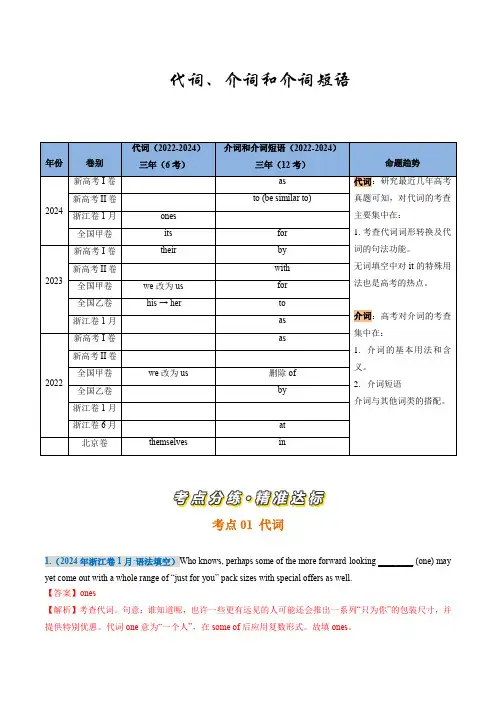
代词、介词和介词短语考点01 代词1.(2024年浙江卷1月·语法填空)Who knows, perhaps some of the more forward-looking ________ (one) may yet come out with a whole range of “just for you” pack sizes with special offers as well.【答案】ones【解析】考查代词。
句意:谁知道呢,也许一些更有远见的人可能还会推出一系列“只为你”的包装尺寸,并提供特别优惠。
代词one意为“一个人”,在some of后应用复数形式。
故填ones。
preserved for all people of the nation to enjoy-as a national park.【答案】its【解析】考查代词。
句意:这个地方,以其独特而令人惊叹的自然美景,必须被妥善保存供全国人民欣赏。
这里“它们”用形容词性物主代词做定语修饰名词beauty。
3.(2023年全国甲卷改错)In that class, Miss Zhao, our biology teacher, showed we insects on stamps.【答案】we→us【解析】考查代词。
句意:在那节课上,我们的生物老师赵老师给我们看了邮票上的昆虫。
作动词show的宾语,应用宾格us。
故we改为us。
4.(2023年全国乙卷改错)Last Friday my mom decided to color his hair. She studied with all the hair products at the drugstore.【答案】his → her【解析】考查代词。
句意:上周五,我妈妈决定染头发。
此处指“我妈妈染她的头发”,应用代词her。
故his 改为her。
5.(2022年北京卷语法填空)Since people can’t always eat out or cook for ________ (they), they get takeout or order delivery.【答案】themselves【解析】考查反身代词。
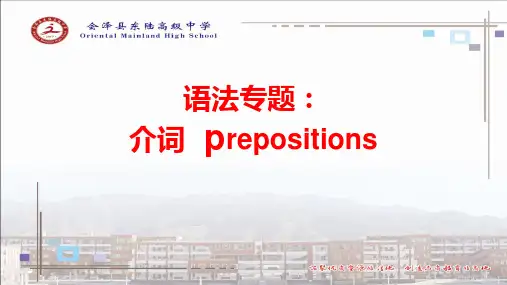
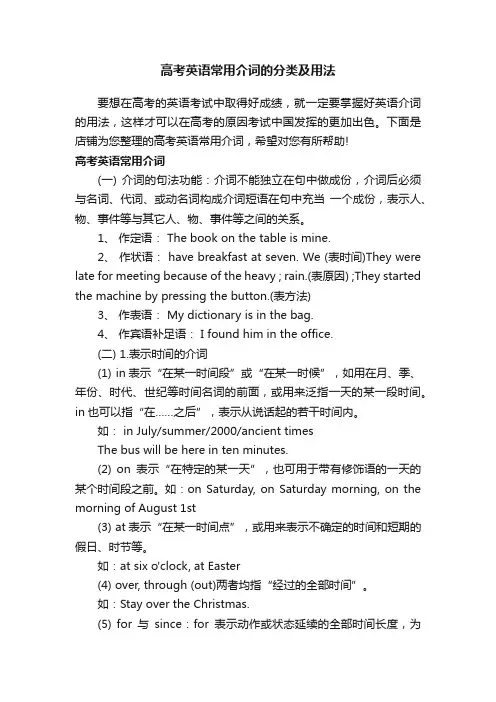
高考英语常用介词的分类及用法要想在高考的英语考试中取得好成绩,就一定要掌握好英语介词的用法,这样才可以在高考的原因考试中国发挥的更加出色。
下面是店铺为您整理的高考英语常用介词,希望对您有所帮助!高考英语常用介词(一) 介词的句法功能:介词不能独立在句中做成份,介词后必须与名词、代词、或动名词构成介词短语在句中充当一个成份,表示人、物、事件等与其它人、物、事件等之间的关系。
1、作定语: The book on the table is mine.2、作状语: have breakfast at seven. We (表时间)They were late for meeting because of the heavy ; rain.(表原因) ;They started the machine by pressing the button.(表方法)3、作表语: My dictionary is in the bag.4、作宾语补足语: I found him in the office.(二) 1.表示时间的介词(1) in表示“在某一时间段”或“在某一时候”,如用在月、季、年份、时代、世纪等时间名词的前面,或用来泛指一天的某一段时间。
in也可以指“在……之后”,表示从说话起的若干时间内。
如: in July/summer/2000/ancient timesThe bus will be here in ten minutes.(2) on表示“在特定的某一天”,也可用于带有修饰语的一天的某个时间段之前。
如:on Saturday, on Saturday morning, on the morning of August 1st(3) at表示“在某一时间点”,或用来表示不确定的时间和短期的假日、时节等。
如:at six o'clock, at Easter(4) over, through (out)两者均指“经过的全部时间”。
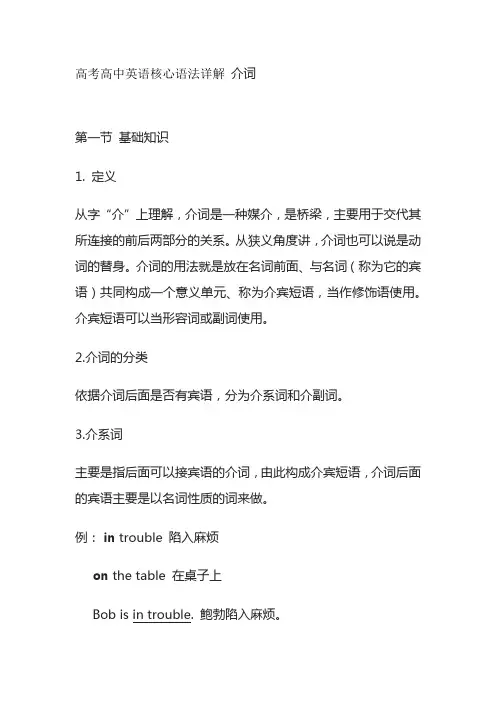
高考高中英语核心语法详解介词第一节基础知识1. 定义从字“介”上理解,介词是一种媒介,是桥梁,主要用于交代其所连接的前后两部分的关系。
从狭义角度讲,介词也可以说是动词的替身。
介词的用法就是放在名词前面、与名词(称为它的宾语)共同构成一个意义单元、称为介宾短语,当作修饰语使用。
介宾短语可以当形容词或副词使用。
2.介词的分类依据介词后面是否有宾语,分为介系词和介副词。
3.介系词主要是指后面可以接宾语的介词,由此构成介宾短语,介词后面的宾语主要是以名词性质的词来做。
例:in trouble 陷入麻烦on the table 在桌子上Bob is in trouble. 鲍勃陷入麻烦。
A red apple is on the table. 一个红苹果放在桌子上了。
4.介副词后面没有宾语,而是直接当副词使用。
Come in. 进来!The soldier stood up. 那名士兵站起来了。
5. 介副词和介词共同使用Mary went down to the basement. 玛丽去了地下室。
down 是介副词,后面没有宾语、直接修饰动词went;to 是介系词,后接名词词组the basement 当宾语、构成一个介词词组to the basement;went 看作不及物动词,后接介词to,再加宾语the basement;He has gone over to your office.over 是介副词,直接修饰动词has gone;to 是介词,后接名词词组your office 当宾语,构成一个介词词组to your office;gone看作不及物动词,后接介词to,再加宾语your office;第二节介系词在短语层面的应用介系词加宾语构成介宾短语后,主要出现在后修饰位置,其作用是交代中心词与其后的宾语之间的关系。
此时介宾短语也可视为形容词的性质。
例:a.2000 entry into the World Trade Organization2000年加入世贸b.an important earner of foreign exchange 赚取外汇的重要来源c. a boom in exports 出口增长第三节介系词在句子层面的应用1. 前状/后状:With the warm weather, the trees grow very well. 天气暖和,树木生长的很好!Kill two birds with one stone. 一石二鸟/一举两得。
高考英语语法填空常考介词在高考英语语法填空中,介词是常考点之一,这些介词考点常常是考生们易错易混淆的地方。
下面就对每个介词考点进行详细的解释和扩充,帮助考生们更好地掌握这些介词的使用规则。
1. 表示时间的介词:at:常用于表示具体的时间点,如at 8 o'clock,at noon等。
on:用于表示在某一天或具体的某一天的上下午,如on Monday,on the afternoon of July 4th等。
in:用于表示在某个时间段内,如in the morning,in the afternoon等。
at the beginning of:在...的开始。
at the end of:在...的结尾。
in the middle of:在...的中间。
during:在...期间。
2. 表示地点的介词:at:用于表示在某个具体的地点或位置,如at the bus stop,at home等。
in:用于表示在某个建筑物、城市或较大的地理区域之内,如in the classroom,in Beijing等。
on:用于表示在某物的表面或与某物接触的表面,如on the table,on the ground等。
near:在...附近。
by:在...旁边。
between:在...之间。
in front of:在...的前面。
behind:在...的后面。
3. 表示方式的介词:by:用于表示通过某种方式或手段,如by bus,by phone等。
in:用于表示以某种状态或形式存在,如in English,in writing等。
on:用于表示在某种物体或表面上,如on the wall,on the table等。
4. 表示原因的介词:because of:由于...的原因。
due to:由于...的缘故。
这两个介词都可以用来表示原因,但略有区别。
because of更强调直接原因,而due to更强调因果关系。
高考英语介词用法总结一、基本用法①介词短语用作形容词时通常置于名词后。
She loves the ring in the shop.她喜欢商场里的那枚戒指。
The lady from the U.S.loves spicy food.从美国来的那位女士很喜欢吃辣。
②介词短语用作副词时,可以灵活地放在句子前后。
We are going to the market.我们在去市场的路上。
---to the market是动词go的副词。
In that case you should go see a doctor.如果那样的话,你去医院看看吧。
---in the case用作修饰句子后半部分内容的副词。
③介词加名词由于介词后一定要接名词,所以如果要用动词的话,应将动词转换为动名词。
She’s not interested in the news.她对这则新闻没兴趣。
I'm so sorry for keeping you waiting.让你久等了,真是对不起。
④介词加宾语介词后加代名词时,应将主格转换为宾格。
I’m fond of him.我很喜欢他。
He's not into her.他不喜欢她。
1)Please, take care of him.请好好照顾他。
2)I'm sorry for being late.很抱歉,我迟到了。
3)Jack is used to working late, but Linda isn’t.杰克习惯工作到很晚,但琳达还不适应。
4)Because of them, the team lost the game.因为他们,所以输了这场比赛。
5)My father depends on me so much.我爸爸太依赖我了。
二、具体用法1.介词in①在...空间里或者是场所in a room 在房间里in the bank 在银行in the hot tub 在热水的浴缸里in the ocean 在海洋里in the sky 在天上in the air 在空中②在城市、国家等相对来说范围较大的场所in the Korean peninsula 在朝鲜半岛in the universe 在宇宙之中in the country 在乡村in the city 在城市里in Seoul 在首尔in Europe 在欧洲③年、月、季节等相对较长的时间in 2002 in the 1980sin March in springin winter in the 20th century④指早上、下午、晚上in the morning 在早上in the afternoon 在下午in the evening 在晚上对比: at noon 中午 at night 晚上⑤表示期间How could you finish he work in 3 days?这件事怎么可能在三天内完成?We can’t get to the island in 5 hours?我们不可能在五个小时之内到那个岛的。
一介词和介词短语介词和介词短语的核心考点介词是虚词,不能单独作句子成分,必须与名词、代词(或相当于名词的其他词类、短语或从句等)构成介词短语,在句中充当一个成分。
介词分为:简单介词,如at,in,for 等;合成介词,如within,inside,onto,throughout等;短语介词,如according to,out of,because of,by means of,in spite of,instead of等;双重介词,如from behind/above/under,until after等;分词介词,如considering,including,judging (from/by) 等。
1.介词搭配(1)“动词+介词”搭配:注意特定搭配与同一介词与多个动词搭配意义不同的情况。
①rob sb. of sth. /clear the road of snow(表示“夺去、除去”意义的动词与of 连用)②supply us with food/fill the glass with wine(表示“供给”意义的动词与with 连用)③make a desk of wood/mak e bread from flour/make the material into a coat(表示“制作、制造”意义的动词与of,from,into连用)④介词+the+部位与动词的关系(=动词+sb. ’s+部位,可换用)strike him on the head(表示“击;拍;碰;摸”意义的动词与on连用)catch him by the arm(表示“抓;拉;拿;扯”意义的动词与by连用)hit the boy in the face(表示“肚;胸;眼;脸”等人体前部的器官名词与in连用)⑤prevent(stop,keep)sb. from doing sth. (表示“阻止,禁止”意义的动词与from 连用)⑥persuade(advise,warn)sb. into doing sth. (表示“说服;建议;警告”意义的动词与into连用)⑦buy(leave,get,win,gain,lose) sth. for sb. (表示“得失”意义的动词与for 连用)⑧tell(show,teach,sing,write,read) sth. to sb. (表示“告知”意义的动词与to连用)⑨give(allow,promise,pass,hand) sth. to sb. (表示“授予”意义的动词与to 连用)注意:⑦⑧⑨可换成buy sb. sth. ,tell sb. sth. ,give sb. sth. 双宾结构。
第八章介词一、概述介词又叫前置词,是一种虚词,在句子中不能单独使用。
只能与名词、代词等构成介词短语,在句中作状语、后置定语、表语和补语等。
介词的作用则是表明它后面的名词或代词(或相当于名词的其它词类、短语或从句)与其它句子成分的关系。
单音节词一般不重读,具有两个或两个以上音节的介词有一个音节要重读。
-What do you want with those old boxes? --你留着那些箱子干什么用?(作状语)-To put things in when I move to the new flat. --搬家时放东西用。
I sat down on one of those modern chairs with holes in it and waited.我坐在一把有网眼的新式椅子上等候着。
(作chairs的定语)She is among my most welcome visitors.她是我最欢迎的来访者之一。
(作表语)I found myself in hospital when I came to myself.我醒来时发现自己躺在医院里。
(作宾补)二、介词的位置1、介词通常位于名词或代词前The sunlight came in through the windows in the roof and lit up the whole room.阳光从天窗穿射入,照亮了整个房间。
This work is beyond my grasp.这件工作非我力所能及。
Shall we rest in the shade beneath these trees? 我们在树下阴凉处休息一下好吗?2、在某些结构中介词可以放在句尾(1)在特殊疑问句中在特殊疑问句中,介词可以放在句尾,和宾语分开,但依然存在着介宾关系。
Who (m) were you speaking to just now? 你刚才在和谁说话?Which desk did you put the book on? 你把书放在那个桌子上了?Who is she talking with? 她在和谁说话?注意:介词也可放在句首疑问词之前连同疑问词一起引起疑问句。
高考英语介词知识点汇总英语中的介词是非常重要的一部分,它用于表示地点、时间、原因、目的、方式等多种关系。
在高考英语中,介词的正确使用是获得高分的关键之一。
下面,我们将汇总一些高考英语常见的介词知识点,以帮助大家更好地掌握这一部分内容。
1. 表示地点的介词(1)In: 表示在某个范围内或地点内。
例如:in the classroom(在教室里)、in London(在伦敦)。
(2)On: 表示在某个表面上或位置上。
例如:on the table(在桌子上)、on the bus(在公交车上)。
(3)At: 表示在某个具体地点或位置上。
例如:at the park(在公园里)、at the door(在门口)。
2. 表示时间的介词(1)In: 表示在某一段时间内。
例如:in the morning(早上)、in May(五月份)。
(2)On: 表示在某个具体的某天或某日期。
例如:on Sunday(星期日)、on June 1st(六月一日)。
(3)At: 表示在具体的某个时刻。
例如:at 2 o'clock(两点钟)、at noon(中午)。
3. 表示原因的介词(1)Because of: 表示由于某个原因。
例如:I couldn't go to the party because of the heavy rain(由于大雨,我不能去参加这个派对)。
(2)Due to: 同样表示由于某个原因。
例如:The game was canceled due to bad weather(由于恶劣天气,比赛被取消了)。
(3)Thanks to: 表示由于某个原因而感谢。
例如:Thanks to my teacher's help, I passed the test(多亏了我的老师的帮助,我通过了这个考试)。
4. 表示目的的介词(1)For: 表示为了某个目的。
例如:I bought a gift for my friend's birthday(我买了一份礼物给我朋友过生日)。
高考英语介词讲解公司内部编号:(GOOD-TMMT-MMUT-UUPTY-UUYY-DTTI-(一)方位介词1.图解方位介词如:Be careful,there is a heavy box over your head。
The sun is above the mountain in the east。
There are some stamps on the desk。
The position he pointed to was below the sea level。
The little mouse is under the table,so it is not easy to find it。
The Great Wall winds its way from west to east,across desert,over mountains,through valleys,till at last it reaches the sea。
The crowd of people walked past the City Hall to the Center Square。
2.at,in两词均表示地点,“在……处”。
at用于指较小的地方,如在门牌号码前;in用于指较大的地方。
如:We’ll meet each other at the park。
我们将在公园见面。
Mr. White lived in Hong Kong for 20 years。
怀特先生在香港生活了20年。
3.in,on,to用在方位名词前的区别三词都可表示两地之间的方位关系。
in表示在某范围之内;to表示在某范围之外;on表示“毗邻”、“接壤”。
如:Shandong province is/lies in the east of China。
(在某范围之内)Shandong is/lies to the southeast of Hebei province。
(在某范围之外)Mongolia is/lies on the north of China。
(接壤)4.from,out of用于表示具体的日子或一个待定的时间,如某日、某节日、星期几等。
如:on October the first,on a rainy day,on National Day。
用于表示特定的早晨、下午或晚上。
如:on the eve of victory,on the morning of January the third,on the afternoon of his arrival。
表示“准时,按时”:on time。
(4)by的用法表示“不迟于……,在(某时)前”。
如:He must have arrived there by now。
他现在一定已经到了。
We’ll have finished the work by ten o’clock tomorrow。
我们在明天十点之前就会完成工作。
表示“在……期间”“在……时间内”。
如:He worked by night and slept by day。
他晚上工作,白天睡觉。
说明:当时间名词前有this,that,last,next,some,every等词限定时,通常不用任何介词。
2.after,inin表示时间,常表示“在……时间之内”,有时in还有“在……时间之后”的意思,但表示此意时,必须具备两个条件:(1)所修饰的动词必须表将来;(2)后面必须是一段时间。
这两个条件缺一不可,否则应用after或later来表达。
如:My father will be back in three days。
我父亲将在三天以后回来。
My father will be back after 3 o’clock。
我父亲将在3点后回来。
My father came back after 3 days/3 days after/3 days later。
(四)原因介词原因介词有:because of,due to,thanks tobecause of“因为,由于”,通常作状语,位于句首或句中。
due to“由于,因为”,通常作表语。
thanks to“幸亏,多亏”,既可用于褒义,又可用于贬义,多用于句首。
如:The sports meeting will be put off till next Saturday because of the heavy rain。
His illness was due to smoking and drinking。
Thanks to the Party’s good policy,the farmers are now living a happy and rich life。
易错知识总结(一)for与of表示不定式复合结构的逻辑主语1.It is + adj. + of sb. to do sth.=sb. + be + adj. + to do sth.当形容词说明不定式逻辑主语的性质、特性时,用of。
常见的形容词有kind,good,nice,clever,stupid,foolish,considerate,polite,impolite,cruel等。
如:It is kind of the teachers to help support the poor students。
= The teachers are kind to help support the poor students。
2.It is + adj. + for sb. to do sth.当形容词说明不定式的性质时,用for。
常见的形容词有important,necessary,possible,impossible等。
如:It is quite important for us to protect our environment。
(二)on与in表示处于某种状态He answered all the questions except the last one。
除最后一个问题没有答外,其余问题他都答了。
I have a few friends besides you。
除了你之外,我还有几个朋友。
All of them went to Beijing last summer besides Tom。
除了汤姆外,他们去年夏天也都去了北京。
(3)except for表示“除了(因为)……”之意,用来表示从某一细节方面来修正前面概括性的说法,其后的宾语一般与句子所涉及的东西不属同类。
如:The composition is good except for a few spelling mistakes。
这篇作文很好,只是有一些拼写错误。
3.except和but/ other than后都可接名词、代词、动名词、动词原形,并且可以互换;但except后接副词、介词短语、when从句等时,but/ other than不可替换except。
如:He has always been in high spirits except recently。
除近来外,他总是精神饱满。
(副词)The window is never opened except in summer。
除夏季外,这扇窗户从不打开。
(介词短语)He has always been busy except when it is Sunday。
除星期日外,他总是很忙。
(when从句)4.but,except后都可接that从句作宾语,两者可以互换。
如:I asked nothing from him but/ except that he should write to me every otherweek。
我只要求他每两周给我写一封信。
餐;at school在上学;at college在上大学;at risk有危险,冒风险;at last最后;at rest静止不动2.from:from memory凭记忆;from cover to cover从头至尾;from day to day日复一日;from beginning to end从头到尾;from head to toe从头到脚3.in:in high/ poor/ bad spirits情绪高涨/低落;in tears热泪盈眶;in fear在恐惧中;in danger在危险中;in peace和平相处;in safety很安全;in need需要;in good order很整齐;in silence静静地;in good health身体好;in a fever在发烧;in love在热恋中;in public在公共场所;in doubt有疑问;in print在印刷;in flower在开花(七)of + 抽象名词=形容词of + great/ much + 抽象名词=very + 形容词;of + no + 抽象名词=not + 形容词。
如:It is of great/ much value。
=It is very valuable。
The camel is of great help to the Arab。
=The camel is very helpful to the Arab。
(八)to与情感名词连用to与情感名词连用,表示某种行动后产生的感觉。
to one’s delight/ surprise/ horror/ sorrow/ joy/ regret=to the delight/ surprise/ horror/ sorrow/ joy/ regret of sb.。
这种表达法表示结果,用作状语,位于句前、中、后皆可。
为了强调,可在前面加much,意为“使某人……的是”。
(九)as和like的区别我有口信带给汤普森夫人。
He came downstairs with his coat over his arm。
他把外衣搭在胳膊上走下楼来。
4.引导一个表示方式的状语附加语。
如:She lay back in the chair with her eyes closed。
她闭着眼睛背靠在椅子上坐着。
He looked at me with a frown。
他皱着眉头看我。
同样的用法还有:with a sneer嘲笑的,with a sigh叹声叹气地,with a sob抽噎的,with a laugh哈哈一笑、大笑着。
5.指原因或理由。
如:She was shivering with cold。
她冷的发抖。